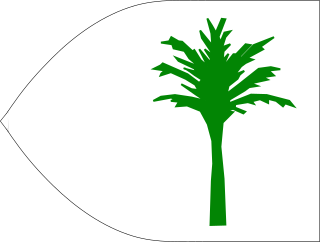
The Kanem–Bornu Empire existed in areas which are now part of Nigeria, Niger, Cameroon, Libya and Chad. It was known to the Arabian geographers as the Kanem Empire from the 8th century AD onward and lasted as the independent kingdom of Bornu until 1900.
Hausa–Fulani are people of mixed Hausa and Fulani origin. They are primarily found in the Northern region of Nigeria, most of whom speak a variant of Hausa or Fula or both as their first language. The term Hausa-Fulani is also used mostly as a joint term to refer to both the monoethnic Hausa and Fulani ethnic populations in Northern Nigeria.

The Jihad of Usman dan Fodio was a religio-military conflict in present-day Nigeria and Cameroon. The war began when Usman dan Fodio, a prominent Islamic scholar and teacher, was exiled from Gobir by King Yunfa, one of his former students.

The Sokoto Caliphate, also known as the Sultanate of Sokoto, was a Sunni Muslim caliphate in West Africa. It was founded by Usman dan Fodio in 1804 during the Fulani jihads after defeating the Hausa Kingdoms in the Fulani War. The boundaries of the caliphate extended to parts of present-day Cameroon, Burkina Faso, Niger, and Nigeria. By 1837, the Caliphate had a population of 10-20 million people, becoming the most populous empire in West Africa. It was dissolved when the British, French, and Germans conquered the area in 1903 and annexed it into the newly established Northern Nigeria Protectorate, Senegambia and Niger and Kamerun respectively.

Dixon Denham was an English soldier, explorer of West Central Africa, and ultimately Governor of Sierra Leone.

Bain Hugh Clapperton was a Scottish naval officer and explorer of West and Central Africa.

Borno is a state in the North-East geopolitical zone of Nigeria. It is bordered by Yobe to the west for about 421 km, Gombe to the southwest for 93 km, and Adamawa to the south while its eastern border forms part of the national border with Cameroon for about 426 km. Its northern border forms part of the national border with Niger for about 223 km, mostly across the Komadougou-Yobe River, and its northeastern border forms all of the national border with Chad for 85 km. It is the only Nigerian state to border up to three countries. It takes its name from the historic emirate of Borno, with the emirate's old capital of Maiduguri serving as the capital city of Borno State. The state was formed in 1976 when the former North-Eastern State was broken up. It originally included the area that is now Yobe State, which became a distinct state in 1991.
Adama ɓii Ardo Hassana, more commonly known as Modibbo Adama, was a Fulani scholar from the Yillaga (Yirlaɓe) clan. He led a jihad into the region of Fombina and established the emirate of Fombina, also known as Adamawa.

The Adamawa Emirate is a traditional state located in Fombina, an area which now roughly corresponds to areas of Adamawa State and Taraba state in Nigeria, and previously also in the three northern regions of Cameroon, including minor Parts of Chad and the Central African Republic.
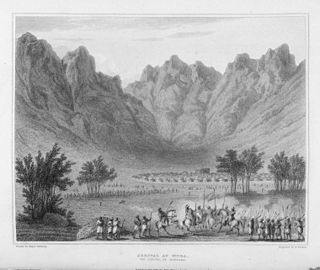
The Mandara Kingdom was an African kingdom in the Mandara Mountains of what is today Cameroon. The Mandara people are descended from the kingdom's inhabitants.
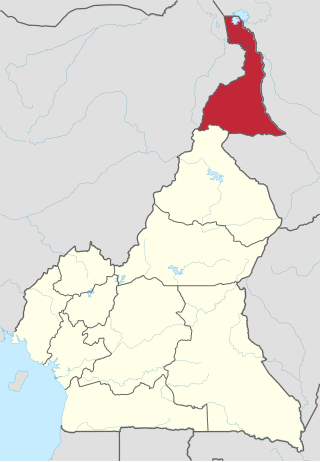
The Far North Region, also known as the Extreme North Region, is the northernmost and most populous constituent province of the Republic of Cameroon. It borders the North Region to the south, Chad to the east, and Nigeria to the west. The capital is Maroua.
al-Haj Idris Alooma was Mai (ruler) of the Bornu empire, covering parts of Chad, Cameroon, Niger and Nigeria. His achievements are primarily chronicled by Ahmad bin Fartuwa, his chief Imam. His reign marked the end of the Kanem civil wars within the state, reuniting N'jimi, the former capital, under Sayfawa control. Furthermore, he introduced significant legal reforms based on Islamic law, establishing qadi courts that operated independently from the executive branch. He was credited with leading the empire to what is often regarded as its zenith during the late 16th-century and early 17th-century.
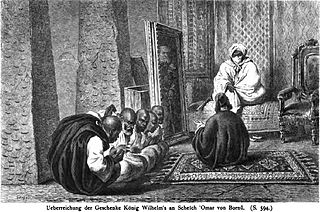
Umar I ibn Muhammad al-Amin or Umar of Borno was Shehu (Sheik) of the Kanem–Bornu Empire and son of Muhammad al-Amin al-Kanemi.

Shehu Muhammad al-Amîn al-Kanemi was an Islamic scholar, teacher, religious and political leader who advised and eventually supplanted the Sayfawa dynasty of the Kanem–Bornu Empire. In 1846, al-Kanemi's son Umar I ibn Muhammad al-Amin became the sole ruler of Borno, an event which marked the end of the Sayfawa dynasty's 800 year rule. The current Shehu of Bornu, a traditional ruler whose seat remains in modern Borno State, Nigeria, is descended from al-Kanemi.

The Adamawa Wars (1899–1907) were initially a series of military expeditions and border conflicts between the German Schutztruppe in Kamerun and the Fula Sunni Muslim states and tribes that were a part of the Sokoto Empire, particularly the Emirate of Adamawa in the northern half of the region. After these territories were annexed major resistance continued for years and several uprisings occurred.

'Abd ar-Rahman, Abdurrahman or Darman was Shehu of Borno from 1853 to 1854.
Kyari or Khair bin Bukhar al-Kanemi (?-1894) was Shehu of Borno in 1893–1894.
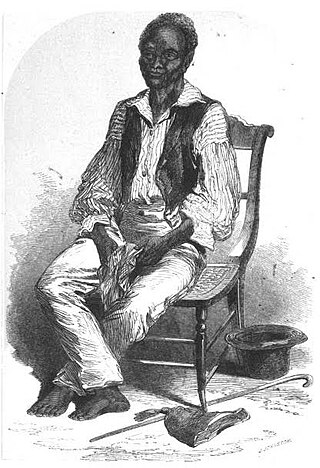
Ali Eisami Gazirmabe of Bornu, later known as William Harding, was a Kanuri man liberated from slavery by the British Royal Navy. Afterwards, he lived in Sierra Leone and worked with the German missionary Sigismund Koelle in creating a Kanuri grammar. In addition, Koelle recorded Eisami's stories of his life, composing a short memoir of his enslavement; Koelle refers to the Kanuri man as "Ali Eisami Gazirma", that is, Ali, whose mother was Eisa, from Gazir.
Shehu Hayatu ibn Sa'id, also known as Hayatu Balda, was a 19th-century Islamic scholar and the leading Mahdist leader in the Central Sudan region. He was the great-grandson of Usman dan Fodio, the leader of the Sokoto jihad and first caliph of Sokoto. Hayatu left Sokoto in the late 1870s to settle in Adamawa, the emirate on the easternmost end of the caliphate. In 1883, he was appointed as the deputy of the Sudanese Mahdi, Muhammad Ahmad, and was tasked with leading a jihad over the Sokoto Caliphate. Despite several attempts by Lamido Zubeiru of Adamawa to persuade Hayatu to abandon his Mahdist cause, conflict ensued resulting in a disastrous defeat for Zubeiru's forces in 1893. This victory bolstered Hayatu's following and influence, leading to an alliance with Rabih az-Zubayr, a Sudanese warlord and Mahdist sympathiser. Together, they conquered the weakened Bornu Empire in 1893, aiming eventually to conquer the Sokoto Caliphate. Hayatu served as the Imam of Rabih's Bornu, acting as its spiritual leader. However, the alliance eventually fractured, and Hayatu was killed during an attempted escape from Bornu in 1898.
Galadima is a historical title that referred to a high-ranking official or nobleman within various states of the historical central Sudan region, including the Hausa Kingdoms, Kanem-Bornu, and the Sokoto Caliphate. The title was typically held by individuals responsible for overseeing administrative, military, or diplomatic affairs. Although the exact roles and responsibilities of the Galadima varied across different polities, it was consistently associated with influential and authoritative figures. Today, the title exists as an honourific in most states in Northern Nigeria.














